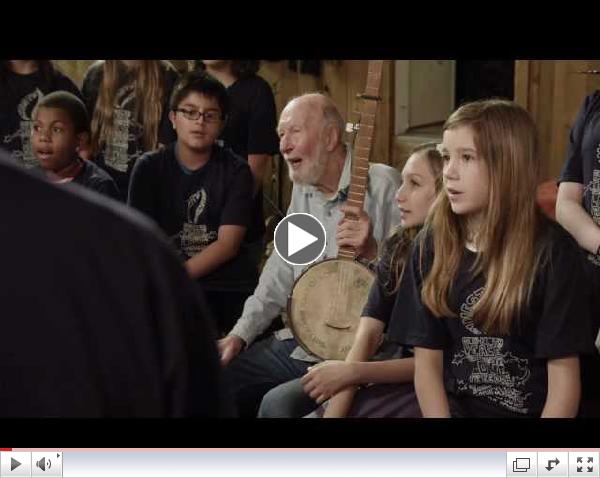 | The Story Behind
"Forever Young"
by Pete Seeger |
|
Blog of the Week...
 
|
 The new annual edition of our journal of discussion and analysis is now out. More than 170 pages, it includes 14 articles on strategy austerity, organizing, and the right. Cost is $10 plus shipping. Or get one by becoming a sustainer. Click the title to buy it directly. The new annual edition of our journal of discussion and analysis is now out. More than 170 pages, it includes 14 articles on strategy austerity, organizing, and the right. Cost is $10 plus shipping. Or get one by becoming a sustainer. Click the title to buy it directly.
|
 | |
Journal of the Black Left Unity Network
|
|

New CCDS Book Reporting on Vietnam
|
|
Radical Jesus:
A Graphic History of Faith 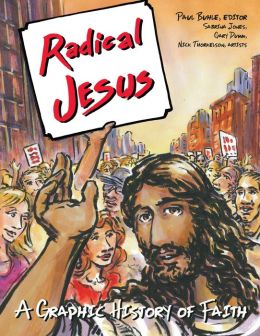 By Paul BuhleHerald Press By Paul BuhleHerald Press
|

Want to Know what CCDS has
been doing...Check it Out!
|
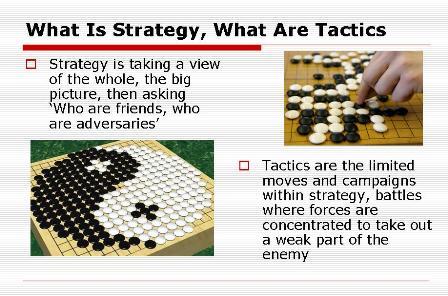 Keep On Keepin' On Keep On Keepin' OnHating the 'Middle Class,' Why Socialists Run in Elections, Strategy and Tactics Slide Slow, Class and Privilege, the Green New Deal ...and other Short Posts on Tumblr by Carl Davidson
|

Edited by Carl Davidson Revolutionary Youth the the New Working Class: The Praxis Papers, the Port Authority Statement, the RYM Documents and other Lost Writings of SDS
Changemaker, 273pp, $22.50
For the full contents, click the link and view 'Preview' under the cover graphic.
|
|
By Randy Shannon, CCDS

"Everyone has the right to work, to free of employment, to just and favorable conditions of work and to protection against unemployment."
- United Nations Universal Declaration of Human Rights, December 10, 1948
I. Introduction
The "Great Recession" that began in 2007 has caused the greatest percent of job losses since the Great Depression of 1929. This crisis is the end of an era of unrestrained 'neo-liberal' capitalism that became public policy during the Reagan administration. The crisis marks a new level of instability with the growth of a global financial elite that targeted US workers and our trade unions after World War II.
|
|
Order Our
Full Employment Booklets
 |
...In a new and updated 2nd Edition
Capitalism may well collapse under its own excesses, but what would one propose to replace it? Margaret Thatcher's mantra was TINA...There Is No Alternative. David Schweickart's vision of "Economic Democracy" proposes a serious alternative. Even more fundamentally, it opens the door to thinking about alternatives. His may or may not turn out to be the definitive "successor system," but he is a leader in breaking out of the box. |
 by Paul KrehbielAutumn Leaf Press, $25.64
by Paul KrehbielAutumn Leaf Press, $25.64 | | Shades of Justice Video: Bringing Down a President, Ending a War |
|
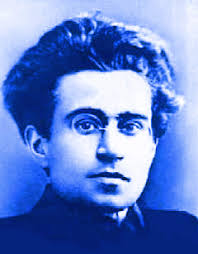 By Giuseppe Fiori
Verso, 30 pages
|

Essays on Mondragon, Marx, Gramsci
and the Green and Solidarity Economies |
Solidarity Economy:What It's All About

Edited by Jenna Allard, Carl Davidson and Julie Matthaei
Buy it here...
|

- Foreword by Susan Brownmiller
- Preface by Ken Wachsberger
$37.50 + $6 shipping
|
|
Discussion Documents for a Militant Movement

By Don Hamerquist
|
|
|
|
An Invitation to CCDSers and Friends...
 The Blowback The Blowback
From Empire
and the Need
for Solidarity
We're the Committees of Correspondence for Democracy and Socialism...Do you have friends who should see this? Pass it on...Do you have a blog of your own? Others you love to read every day? Well, this is a place where you can share access to them with the rest of your comrades. Just pick your greatest hits for the week and send them to us at carld717@gmail.com! Most of all, it's urgent that you oppose war on Iran, defend voter rights, plan for 2014 races now, oppose austerity, support the 'Moral Mondays' in North Carolina, the fight for the Green New Deal, a just immigration policy and the Congressional Progressive Caucus' 'Back to Work Budget'! We're doing more than ever, and have big plans. So pay your dues, make a donation and become a sustainer. Do it Now! Check the link at the bottom... |
The Children at Our Borders: 21st
Century Descendents of Imperialism

By Harry Targ
Diary of a Heartland Radical
A Military Coup in Honduras
Sunday, June 28, 2009 the Honduran military carried out a Coup ousting duly elected President Manuel Zelaya from power. Almost immediately leaders of Western Hemisphere nations condemned the actions taken in Tegucigalpa, the capital city. For example, former President Luiz Inacio Lula da Silva (Lula) asserted that the days of military coups as a mechanism of the transfer of power were over in Latin America.
President Obama said on the following day that "it would be a terrible precedent if we start moving backwards into the era in which we are seeing military coups as a means of political transition rather than democratic elections.... The region has made enormous progress over the last 20 years in establishing democratic traditions in Central America and Latin America. We don't want to go back to a dark past."
On June 30, the United Nations General Assembly passed by acclamation a non-binding resolution condemning the military action and demanding that Zelaya be returned to office. Political opposites from former Venezuelan President Hugo Chavez, Fidel Castro, Bolivia's Evo Morales, to Barack Obama took the same position on the events in Honduras, although Chavez articulated the view that the United States had a role in the Coup.
The New York Times reported on the Coup and the mass mobilizations in Honduras protesting it. The story did editorialize by pointing out that Zelaya, who was elected in 2006, was closely allied with Hugo Chavez and had linked Honduras to the Chavez led "leftist alliance, the Bolivarian Alternative for the Americas." The Times further reported that there were large scale protests in the capital of Honduras in support of the Coup. And they claimed that Zelaya would have had no world significance if it were not for the Coup which made him famous.
Subsequent to the worldwide condemnations, including from the Obama administration, two elections were held ignoring the Coup, one later in 2009 and another in 2013. In other words, former President Manuel Zelaya, who was ousted was never allowed to return to office.
Journalist John Perry wrote three years after the Coup that Honduras had distinguished itself by its escalating violence. "...the murder rate is four times that of Mexico and it has become the world's most dangerous country for journalists with 23 having been assassinated over the last three years." Perry pointed out that in the Northeast of the country big landowners struggled against small farmers who sought to keep control of their land and the area has become a transit point for drug smuggling (John Perry, "Honduras--Three Years After the Coup," OpenDemocracy.net. June 27, 2012.)
The Relevance of Central American History for Today
The horrific migrations of the young and their families from the Central American war zones in 2014 (and earlier) are explained by media and politicians as caused by the quest of migrants for an improved standard of living to be found in the United States, or flight from homegrown drug gangs, or loose talk from President Obama about asylum for refugees, or failures of the Congress to pass meaningful immigration reform legislation. These common narratives ignore the history of United States imperialism in the Western Hemisphere and particularly the grotesque U.S. inspired violence against the Central American peoples launched by the Reagan administration in the 1980s. Also, they do not address the economic devastation in the region caused by neo-liberal economic policies imposed by the debt and trade systems. Any serious discussion of the current refugee crisis of thousands of young people fleeing poverty and violence should include the following:
First, the Western Hemisphere has experienced hundreds of years of shifting external interference, mass murder and economic exploitation of natural resources, agricultural lands, cheap labor, and sweat shop workers. The Spanish, the British, and the United States figured most prominently in this unhappy story, referred to by Eduardo Galeano as "five centuries of the pillage of a continent."...(Click title for more)
|
|

'Lax enforcement' is not the culprit--U.S. trade and immigration policies are.
By David Bacon
In These Times
The failure of Central America's economies is largely due to the North American and Central American Free Trade Agreements and their accompanying economic changes.
The mass migration of children from Central America has been at the center of a political firestorm over the past few weeks. The mainstream media has run dozens of stories blaming families, especially mothers, for sending or bringing their children north. The president himself has lectured them, as though they were simply bad parents. "Do not send your children to the borders," he said in a June 27 interview with George Stephanopoulos. "If they do make it, they'll get sent back. More importantly, they may not make it."
Meanwhile, the story is being manipulated by the Tea Party and conservative Republicans to attack Obama's executive action deferring the deportation of young people, along with any possibility that he might expand it-the demand of many immigrant rights advocates. More broadly, the far Right wants to shut down any immigration reform that includes legalization, and instead is gunning for harsher enforcement measures. Even Marine Corps Gen. John Kelly, commander of U.S. Southern Command, has sought to frame migration as a national security threat, calling it a "crime-terror convergence," and describing it as "an incredibly efficient network along which anything hundreds of tons of drugs, people, terrorists, potentially weapons of mass destruction or children-can travel, so long as they can pay the fare."
All of this ignores the real reasons families take the desperate measure of leaving home and trying to cross the border. Media coverage focuses on gang violence in Central America, as though it was spontaneous and unrelated to a history of U.S.-promoted wars and a policy of mass deportations.
In truth, the United States' meddling foreign policy and a history of the U.S.'s own harsh immigration measures are responsible for much of the pressure causing this flow of people from Central America. These eight facts, ignored by the mainstream press and the president, document that culpability and point out the need for change:
1. There is no "lax enforcement" on the U.S./Mexico border. There are over 20,000 Border Patrol Agents; that number was as low as 9,800 in 2001. We have walls and a system of large, centralized detention centers that didn't exist just 15 years ago. Now more than 350,000 people spend some time in an immigrant detention center every year. The U.S. spends more on immigration enforcement than all other enforcement activities of the federal government combined, including the FBI, the Drug Enforcement Administration and the Bureau of Alcohol, Tobacco, Firearms and Explosives. The growing numbers of people in detention-young people as well as families and adults- is being used as a pretext by the anti-immigrant lobby in Washington, including the Tea Party and the Border Patrol itself, for demanding increases in the budget for enforcement. The Obama administration has given way before this pressure....(Click title for more)
|
By Marjorie Cohn
Truthout
July 14, 2014 - Mourners at a morgue after an overnight Israeli air strike in Gaza City, July 13, 2014. (Photo: Tyler Hicks / The New York Times)Mourners at a morgue after an overnight Israeli air strike in Gaza City, July 13, 2014. (Photo: Tyler Hicks / The New York Times)
Israel has commenced full-scale warfare on the people of Gaza. The recent tensions began about six weeks ago when Israeli forces abducted 17 Palestinian teenage boys in the occupied West Bank. Then, on June 12, three Israeli teenagers were abducted in the southern West Bank; Israel blamed Hamas. After the three youths were found dead, a group of Israelis tortured and killed a Palestinian teenager in Jerusalem. Finally, on July 7, Israel launched a large military operation dubbed "Operation Protective Edge" in the Gaza Strip.
During the past week, Israel has killed 162 Palestinian civilians and counting, including 34 children. In addition to more than 1,200 Israeli airstrikes, Israel has threatened to launch a ground invasion of Gaza. Israel attacked a center for the mentally and physically disabled in Beit Zahiya, killing three patients and a nurse. In addition, Israel has stepped up demolitions of Palestinian homes, and administrative detentions of Palestinians without charge or trial.
The UN Office for the Coordination of Humanitarian Affairs(OCHA) reported that 77 percent of the people Israel has killed in Gaza were civilians. Although Hamas has launched about 1,000 rockets into Israel in the past week, no Israelis have been killed.
UN High Commissioner for Human Rights Navi Pillay expressed alarm at the Israeli military operations as well as the indiscriminate firing of rockets from Gaza into Israel. "For its part, the Government of Israel must take all possible measures to ensure full respect for the principles of distinction, proportionality and precautions in attack, during the conduct of hostilities, as required by international humanitarian law. In all circumstances, they must avoid targeting civilians," she said. In light of "deeply disturbing reports that many of the civilian casualties, including of children, occurred as a result of strikes on homes," Pillay continued, "serious doubt [has been raised] about whether the Israeli strikes have been in accordance with international humanitarian law and international human rights law."
The principle of distinction forbids deliberate attacks on civilians or civilian objects. The proportionality principle forbids disproportionate and excessive civilian casualties compared to the claimed military advantage gained in the attack. Precaution requires that measures be taken in advance to ensure compliance with the principles of distinction and proportionality, to minimize incidental loss of civilian life, injury to civilians and damage to civilian objects, and requires taking all feasible precautions in the choice of means and methods of warfare.
Collective Punishment by Israel
Headlines in the mainstream media falsely portray an equivalence of firepower between Israelis and Palestinians in Gaza. But Israel's use of force greatly exceeds that of the Palestinians, and the asymmetric warfare continues to escalate. The Obama administration and Congress have condemned the rocket fire into Israel by Hamas and the "deliberate targeting of civilians." But Washington says Israel has a right to defend itself, justifying Israel's bombing campaign in Gaza and blaming Hamas, while minimizing Israel's role in creating and escalating the violence. ...(Click title for more)
|
By Paul Rosenberg
Salon.com
July 12, 2014 - If you Google "Rand Paul Civil Rights Act," the first prompt that comes up is "unconstitutional," so it was definitely heartening to see his apparent about-face on the act's 50th anniversary, whenhe attended a local commemoration [2] at the Shelbyville, Kentucky, home of Dr. Maurice F. Rabb, a prominent civil rights activist in the 1940s and '50s. "Every major civil rights activist that came to the South stayed with my parents," Chris Rabb said. "They were not allowed to stay in hotels."
Paul has previously voiced his objection to the Civil Rights Act precisely because it put an end to such private-sector discrimination. But on this occasion, he released a statement saying, "'It is simply unimaginable to think what modern America would be like if it were not for the brave men and women who stood up for the rights of all Americans. The legislation changed the future of our nation by enforcing the belief that all men and women are created equal."
The next day, Rachel Maddow duly noted [3] Paul's change of heart. "Rand Paul went to Shelbyville yesterday, and he sang the praises of the civil rights movement and the civil rights activists and specifically the Civil Rights Act of 1964," she said, going on to repeat Paul's statement, even displaying it on screen. "Rand Paul coming out in full support of the Civil Rights Act of 1964," she said afterward, "which is nice, and I don't mean to be raining on the parade, but I have to point out that this marks something of a shift in Rand Paul's position on this legislation." She then replayed a clip of her famous May 19, 2010 interview with Paul, in which he repeatedly refused to say he would have supported the bill. Specifically, she played a segment in which Paul said, "There's 10 different titles, you know, to the Civil Rights Act, and nine out of 10 deal with public institutions, and I'm absolutely in favor of. One deals with private institutions, and had I been around, I would have tried to modify that." He went on to indicate that he might or might not have finally agreed to support the bill, with just one title that he objected to.
I can't help but join with Maddow in applauding Paul's change of heart - but I do still harbor some deeper doubts, not least because Paul has dissembled, disinformed and confused so frequently and so much on the subject over the years - he's even gotten the number of titles in the Civil Rights Act wrong; there are 11 of them, not 10. More significantly, as Ian Millhiser noted back on April 10, 2013 [4], there are numerous examples of Paul going on the record - both in print and on videotape - expressing his opposition to the Civil Rights Act:
Yet on that date, Millhiser noted, Paul insisted otherwise [8] to an audience at the historically black Howard University. "I've never been against the Civil Rights Act. Ever," he said, "I have been concerned about the ramifications of the Civil Rights Act beyond race... but I've never come out in opposition."
It's good that Paul's views have apparently evolved over time, but it's disturbingly less good that he still can't admit the change in his thinking, because there's still a great deal of confusion, contradiction and outright falsehood that he's perpetuating....(Click title for more)
|
Rev. Barber Discusses Voting Rights on MSNBC
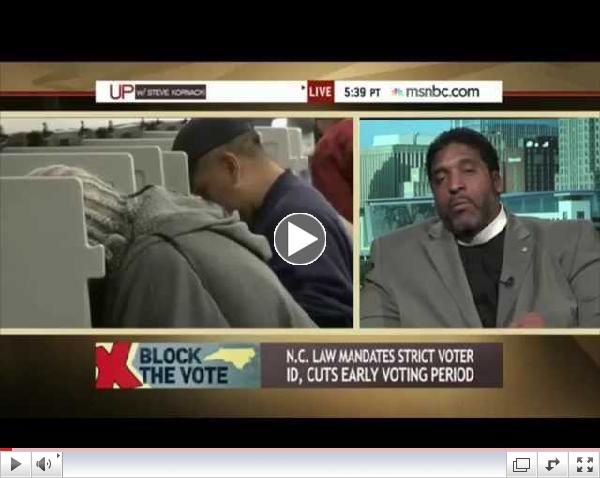 | |
'Moral Monday' Battles Key to Political Change
|
|
Indiana: Ultra-Right-Wing State Nobody Mentions
Workers protest 'Right to Work for Less' in Indiana
By Bryan K. Bullock Truthout
June 27, 2014 - Indiana is a right-wing, conservative state. Somehow, however, the state seems to fly under the radar of the national media when they address the right-leaning activities in other states like Texas and Wisconsin.
This is curious because it has frequently been Indiana at the forefront of many of the right-wing laws that have garnered attention from the national media in other states. Indiana has been ground zero in privatization of public resources, voter ID laws, assaults on reproductive rights, lax environmental regulations and dismantling unions - to name a few pet right-wing initiatives.
Several years ago, much of the media attention was focused on far-right-wing, anti-union activities in the Wisconsin legislature. While this attention was warranted, what was missed was that Wisconsin's neighbor, Indiana, was engaged in similar anti-union and ultra-conservative legislative initiatives. Governor Mitch Daniels, governor at that time, and the Republican-controlled House and Senate had advanced many of the same types of laws that were garnering attention in Wisconsin. One of Daniels' first tasks upon becoming governor was to delegitimize the state's public service unions. The unions had been lawfully recognized as a bargaining unit by executive order. Daniels, with a stroke of a pen, decertified the public sector union, saying that government worked better without them. This garnered some media attention, but not enough to raise the alarm in other states. Daniels continued his assault on unions by pushing charter schools on poor black communities like Gary, Indiana, and, in his final days, by signing so-called "right to work" legislation. The latter issue did pique the interest of national media, but only mildly.
One of Daniels' initial acts as governor that did get some media traction was his decision to privatize the administration of the state's welfare support system. He awarded a $1.34 billion contract to IBM to deliver the state's welfare system. This taxpayer giveaway met with little resistance and culminated in disastrous results - with IBM eventually suing the state of Indiana when Daniels rescinded the contract. His next big privatization scheme was to lease the state's toll road. He leased the state's toll road, which happens to run through the poor communities of Gary, Hammond and East Chicago, but the governments and citizens of those communities received nothing in return for the lease. This move also displaced many former state toll road employees. Daniels never advanced any progressive jobs agenda that would put the state's poor and minority citizens to work in good-paying jobs. His answer to the state's poor job creation was to privatize everything and bust up the unions. Despite this record, Indiana is not mentioned among the pantheon of conservative states in America....(Click title for more)
|
By Arlene Eisen
Venezuelanalysis, Caracas
June 19, 2014 - On June 7, President Nicolas Maduro issued a call to each grassroots unit of the United Socialist Party of Venezuela (PSUV) to submit 10 concrete proposals for ways to improve how the Bolivarian government functions.
In response, throughout Venezuela, local units of PSUV militants, known as Battle Units Bolivar-Chavez (UBCh), devoted their weekly meetings to lively debates analysing political problems and attempting to reach consensus on solutions. There are some 13,500 UBChs.
Other Venezuelans joined the discussions through forums, meetings, editorial pages and social media.
A well-attended forum in Catia, a working-class district of western Caracas, set the tone for many other UBCh meetings. Catia is known and respected for being a centre of Chavista militancy. Aporrea.org and other pro-revolution media repeatedly ran written and videotaped reports of the proposals made there by a Gonzalo Gomez, spokesperson from Marea Socialista (Socialist Tide), a leftist grouping within the PSUV, and by Manuel Sutherland, a Marxist economist who coordinates the Center of Worker Investigations and Education and teaches at the Bolivarian University of Caracas (UBC).
Sutherland demonstrated with charts and detailed narrative how government negotiations with the owning class have not stopped the bourgeoisie from amassing huge fortunes and from driving the economy into a deep ditch. He challenged the fantasy, held by some PSUV reformists, that business owners in Venezuela are patriotic and renounce super profits gained from fraudulent imports and currency speculation. Rather he showed how Venezuela's 400,000 capitalists appropriate 60% of Venezuela's gross domestic product (PIB) to the detriment of 13 million workers who receive the remaining 40%.
In other words, the bourgeoisie still controls the bulk of the economy, and by implication, political power in Venezuela. With this power, the owning class has squandered Venezuela's dollar reserve in order to make astronomical profits. They import goods paid for in petrodollars and then sell them for as much as 1500% profit at home. The result is devaluation, inflation and scarcity. Some call this "economic warfare" waged by the oligarchs. But, Sutherland insisted, the warfare metaphor implies that there can be peace and therefore underestimates the depth of the structural problem.
He proposed a major structural change for the governing PSUV: to nationalise all of Venezuela's international trade. Sutherland pointed out that three years ago Hugo Chavez had made the same proposal. He quoted the revered PSUV founder: "Create a state corporation for imports and exports to end the bourgeoisie's hegemony over imports. We look like pendejos (idiots, wimps) giving dollars to the bourgeoisie. They import, overcharge, buy whatever is desired for one dollar and charge five dollars here."
Inside another UBCh meeting
Several days later, across town in the upscale neighbourhood of Baruta, UBCh militants took up Sutherland's proposal in the context of a wide-ranging discussion of their own 10 proposals to send to President Maduro. They sat in a circle in the modern, airy cafeteria on the 11th floor of a PSUV office building. It was a small group: mostly women, many of them professionals, many retired. Through the surrounding windows, the US flag could be seen flying from a pole in front of the US Embassy, now closed to the public.
They began by talking about the problem of bureaucracy. A woman who dressed more humbly than the rest of the group suggested that the PSUV set up a storefront in every municipality to help people navigate the system. Another woman, a retired nurse, remarked that the Missions [government-funded social programs] had been set up to circumvent the problem of bureaucracy, but that in many cases, they too had become bureaucratised. A sociologist and film maker remarked how the state is still controlled by the capitalists and implied that only socialism would solve the problem of bureaucracy. Then she frowned and added, "with the threats from the coup-plotters (golpistas), the state has its back against the wall and has to make deals with the bourgeoisie." The woman who began the conversation sighed, more from impatience than resignation and said, "How long are they going to be giving in to the opposition and not to us?"
Then, for a moment, people aired related complaints. "The private monopolies are thieves." "The justice system is corrupt. They killed 400 campesinos and no one has ever been tried." ...(Click title for more)
|
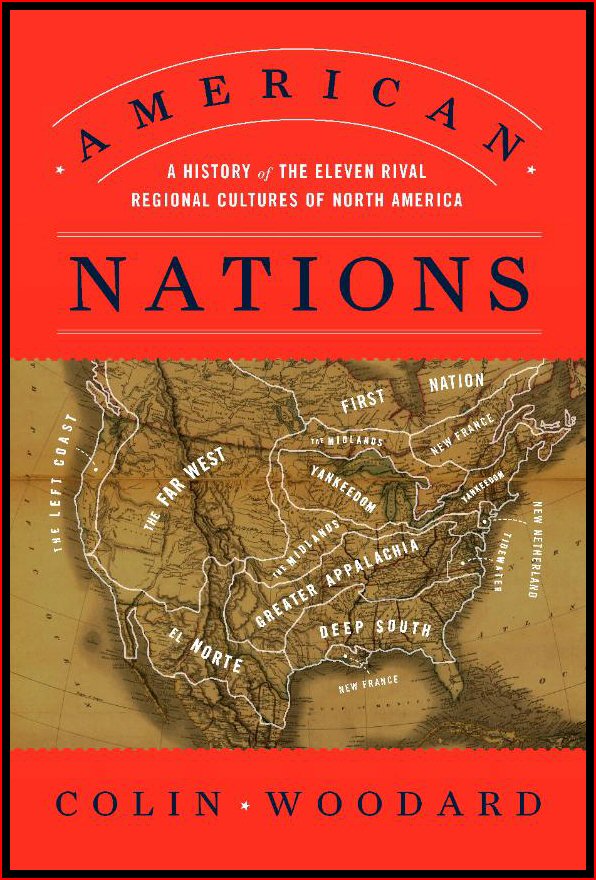 By Dave in Northridge By Dave in Northridge
Daily KOS
Actually, the book's REAL title is American Nations: A History of the Eleven Rival Regional Cultures of North America by Colin Woodard (Penguin Books, 2011). This review demonstrates that I've been doing most of my writing for Top Comments recently, since it was motivated by a comment thread started by cuphalffull's recommendation of the book in DrJohnB's diary on the roots of the polarization we see in today's politics.
No, I'm nowhere in the thread, because I remembered that I had read the book and there was something I found hinky about it, but I figured that the people recommending the book meant that maybe I should reconsider it.
I've reread it, and it IS an interesting read, but it's more solid in some parts than it is in others, and it sort of loses its way between the Revolution and today, although the conclusion is provocative. The problem is akin to the Greek myth about Procrustes' bed.
So what this is is a case study of how a professional historian looks at a history book written by a, well, journalist. It's the stuff you have to look out for when you're reading material by the Walter Isaacsons and the John Mechems of the world.
The premise of the book is that the roots of partisanship in American politics -- in fact, the origins of American political culture -- lie in the patterns of settlement of North America in the sixteenth and seventeenth century, and the movement west by the descendents of the original settlers and by immigrants during the eighteenth and nineteenth centuries. It's a good premise and Woodard provides it with a good explanatory matrix. The sociologists who study immigration have observed that people tend to move west along latitudinal lines, thus migrants west from Massachusetts would end up in Michigan and Wisconsin while migrants from Georgia would end up in Arkansas or Texas. Here are the eleven regions in order of settlement:
1. First Nations (now the Canadian province of Nunavut)
2. El Norte (the Spanish settlement of Northern Mexico and what's now New Mexico starting in the 1560s)
3. New France (the watershed of the St. Lawrence River, 1612)
4. Tidewater (Jamestown, 1607)
5. Yankeedom (Plymouth, 1620)
6. New Netherland (1626)
7. The Deep South (The Carolinas, colonies of the sugar planters of Barbados, c 1670)
8. The Midlands (William Penn, 1681)
9. Greater Appalachia (starting in 1718)
10. The Left Coast (starting in the 1830s, accelerating after 1848)
11. The Far West (after the Civil War)
Here they are mapped out:

In the first part of the book, Woodard maps out the early settlement of North America by European colonizers in pretty much chronological order before 1769. He sets out the nine nations well, with their cultural traits and their contributions to what would become three new nations (his discussion of how the northern provinces of Mexico are not very much like Mexico further south is very good), and he does an excellent job in explaining what the bloodless coup Glorious Revolution of 1688 meant to the British colonies, which is something our textbooks don't do a good job with. Naturally, there are no Indians (except, of course, Pocahontas and Squanto) in this section but that has stopped surprising me. ...(Click title for more)
|
|
By Abby Garnett
Village voice
It's hard to say exactly whom writer-director Kevin Asch is trying to warn with Affluenza, a teen drama about wealthy Hampton-ites that engages in more than a little virtuous tut-tutting.
Is he cautioning a younger generation, in danger of taking their privilege for granted? Or, as suggested by a businessman who berates photographer and sometime weed dealer Fisher (Ben Rosenfield) in the opening scene, their laissez-faire parents?
Or is the audience simply being warned away from types like Fisher's host for the summer, a manic uncle played by Steve Guttenberg whose off-putting pencil mustache alone makes him a dubious role model?
Whoever it's aimed at, the film is more focused on lamenting American culture than correcting it. Affluenza is set in 2008 on the cusp of the financial collapse, and is filled with musings about the hypocrisy of government bailouts. Which is okay, because neither Fisher, nor anyone else here, is very engaged-he and his cousin, Kate (Nicola Peltz), waltz out to parties, listen to hip music, and smoke weed by a pool that, as Fisher's aunt (Samantha Mathis) is quick to point out, nobody actually swims in. They're not the most sympathetic kids, but as the title indicates, they're more frequently guilty of apathy than actual bad behavior.
A similar mode of indifference must be adopted to enjoy the film, which comes off like a slightly more realistic (read: less exciting) version of Gossip Girl, a comparison encouraged by Rosenfield's Penn Badgley-esque jawline. There's a mawkish third act full of grave consequences, but ultimately, the film is dragged down by its awkwardly paradoxical story, which tries too hard to care too little. ...(Click title for more)
|
Keep up with the Moral Mondays with a Red Resolution...
Become a CCDS member today!
 The time is long past for 'Lone Rangers'. Being a socialist by your self is no fun and doesn't help much. Join CCDS today--$36 regular, $48 household and $18 youth. The time is long past for 'Lone Rangers'. Being a socialist by your self is no fun and doesn't help much. Join CCDS today--$36 regular, $48 household and $18 youth.
Better yet, beome a sustainer at $20 per month, and we'll send you a copy of Jack O'Dell's new book, 'Climbing Jacobs Ladder,' drawing on the lessons of the movement in the South in the 1950s and 1960s.
Solidarity, Carl Davidson, CCDS
|
|
|